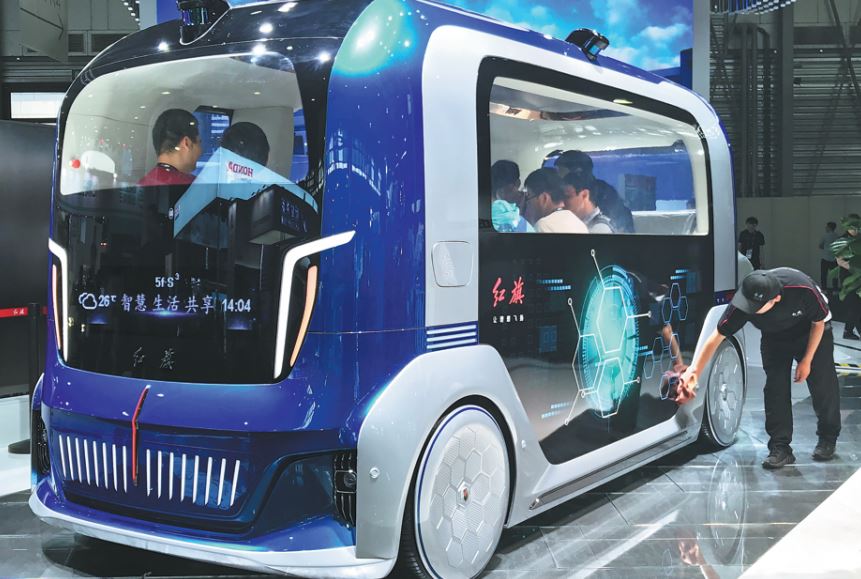Autonomous driving put through its paces at forum

Experts examine what's needed for future development of key industry
A microscope was trained on the coming world of autonomous driving with experts providing inquiry and insights on the technology at the World Intelligent Connected Vehicles Conference, held in Beijing from Oct 22 to 25.
Automakers big and small, technology titans and startups, as well as government leaders attended the four-day event to take part in a series of forums on intelligent connected vehicles, global industry and ecology, policy, regulation and standards as well as the computing and information security.
At these forums, executives with leading Chinese carmakers and prominent new energy vehicle startups gave their thoughts and suggestions on the development of the autonomous driving industry, focusing on the preparations made to develop intelligent connected vehicles.
"To promote the commercialization of intelligent connected vehicles, we should first pay close attention to Chinese customer demands and how the vehicles will be used," said Wang Xiaoqiu, president of SAIC Motor.
He added that carmakers should take full advantage of international and domestic industrial resources to realize high-quality development.
Xu Liuping, chairman of FAW Group, said the company has set up three strategies to develop intelligent connected vehicles, consisting of mastering core technologies, establishing a technology platform with its suppliers of parts, software and hardware systems, and developing supporting technologies and common technologies together with other automakers.
"Future smart vehicles must be fully electric. There are two key things that have to be improved, which are the battery technology and the electric and electronic architecture," said Yan Feng, chief technology officer at VM Motor.
As one of the country's leading technology companies, Huawei is utilizing its strategy of developing information communications technology to offer intelligent support to smart vehicle makers, according to Xu Zhijun, rotating chairman of Huawei Technologies.
Xu added that Huawei is committed to forging intelligent platforms for driving, cabin controls and electrification, as well as developing connectivity technologies which aim to manage all vehicles effectively via cloud services.
Zhang Baolin, chairman of Changan Automobile, said to achieve commercialization of intelligent connected vehicles, some common basic problems need to be solved.
The problems include the existing unsound laws and regulations as well as a lack of standardization.
An array of government leaders and industry professionals shared their views on how to improve laws, regulations and policies related to intelligent connected vehicles and to promote the formulation of relevant standards, testing and certification systems. "Intelligent connected vehicles are an important carrier of cross-industry technology and the integrated development of industries, which asks for the strong support of improved laws, regulations and technical standards," said Bai Hua, director with the automotive division of the equipment industry department of China's Ministry of Industry and Information Technology.
Chen Dong, director of the legal institution department of the traffic management bureau of the Ministry of Public Security, said it attaches great importance to the development of intelligent connected vehicles and is taking initiatives to strengthen research on relevant policies, laws and regulations and standard, so as to promote the healthy and sustainable development of the whole industry.
Wang Zhao, deputy director at the automobile standardization institute of the China Automotive Technology and Research Center, said that intelligent connected vehicles are at a critical turning point from testing to commercialization, which is pushing the formulation of relevant standards.
The China Automotive Technology and Research Center is scheduled to issue more than 30 standards for intelligent connected vehicles by 2020 and more than 100 standards by 2025, forming a standardized system to support high-level autonomous driving.
As autonomous driving technology powers ahead, information security of intelligent connected vehicles has become an inevitable and highly concerning issue.
"Intelligent connected vehicles are complex systems composed of three parts - the car, the intelligence and the connectivity. Any problem in this system may bring serious consequences," said Peng Yonglun, deputy head of the Beijing Products Quality Supervision and Inspection Institute.
Information security is a prerequisite for the development of intelligent connected vehicles, Peng added.
A raft of internet technology companies also shared their solutions in guaranteeing information security for intelligent connected vehicles at the event, including internet giant Tencent, AI driving leader UISEE and Huawei Technologies.
The 2019 WICV was hosted by the Beijing government, China's Ministry of Industry and Information Technology, the Ministry of Public Security, the Ministry of Transport and the China Association for Science and Technology.
Covering an exhibition area of more than 50,000 square meters, the WICV attracted more than 200 exhibitors from home and abroad, showcasing an array of cutting-edge technologies and achievements in intelligent connected vehicles.

